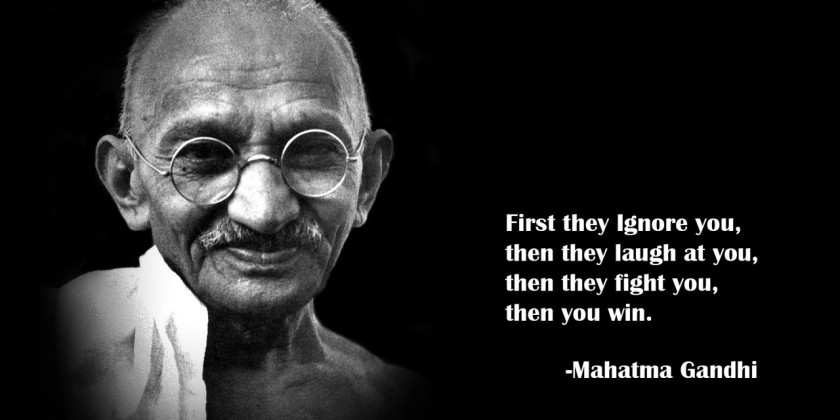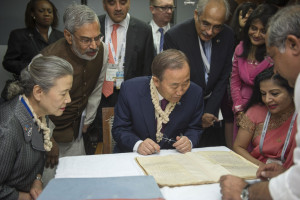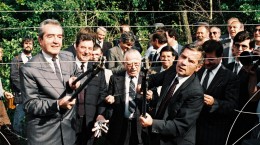Mahatma Gandhi’s spiritual and political ideals are necessary to implement today more than ever as we confront increased radicalization, fundamentalism, and extremism. Paralleling the late Reverend Martin Luther King, Jr., he was an inspiration for civil rights and freedom movements worldwide. A venerable leader, the Mahatma struggled through non-violent civil disobedience to gain self-rule and Indian independence from Britain. A Hindu, he embraced religious and ethnic amity, ending discrimination and “untouchability” between the castes, easing poverty, and expanding women’s rights. Like Martin Luther King, he was assassinated for his inclusive vision. And like Martin Luther King, his spirit and ideals live on. (See: “The Good They Die Young, But MLK’s Message of Hope Reverberates.”)
In Gujarat, India this month, UN Secretary-General Ban Ki-moon commends Gandhi and United Nations commitment to promote tolerance, universal justice and dignity.
UN News Centre
“Divisive politics and sectarian incitement have no place in our modern world. As Gandhi reminded us, ‘There will be no lasting peace on earth unless we learn not merely to tolerate but even to respect the other faiths as our own,’” said Mr. Ban in remarks at Sbarmati Gandhi Ashram, which houses a library and museum chronicling the life, work, and teachings of the legendary leader of India’s independence movement and pioneer of the philosophy and strategy of non-violence.
Indeed, continued the Secretary-General, there is great strength in diversity – and countries that celebrate diversity and embrace every single individual are the ones to shape a secure and stable world, and he looked to India – “a large, diverse and vibrant democracy – to be a champion of the rights, dignity and equality of all people.”
Mr. Ban said that like so many people around the world, he has long admired Mahatma Gandhi and has been personally guided by his teachings, especially his description of “Seven Social Sins”: politics without principles; wealth without work; pleasure without conscience; knowledge without character; commerce without morality; science without humanity; and worship without sacrifice.
“This vision transcends all borders. Gandhi’s compassion embraces all people. I myself have been putting in my best efforts and asking all leaders, far and wide, to live by his teachings,” said Mr. Ban, adding that Gandhi’s emphasis on the poor is reflected today in the work of the United Nations to end poverty and build a peaceful world of dignity for all.“We will succeed only if the memory of Gandhi’s unyielding fight against injustice burns bright in our hearts,” he said, noting that the United Nations marks Gandhi’s birthday as the International Day of Non-Violence – “and we defend his ideals every day of the year.”
Touching on Gandhi’s inspiring and enduring legacy, Mr. Ban said that he would never forget seeing well-worn copies of Gandhi’s books at an exhibition of the papers of Dr. Martin Luther King, Jr. “Nelson Mandela also deeply admired Gandhi. Mandela said Gandhi symbolized hope that when all South Africans are treated as equals, the country would be at peace.”
“The same holds true for our world,” said the Secretary-General, emphasizing: “Mahatma Gandhi preached and followed the message of peace, non-violence and communal harmony. It is a common value that the United Nations promotes and asks leaders near and far to put into practice – from here in Gujarat to the world.”
On the margins of the Summit, the Secretary-General met with Indian Prime Minister Narendra Modi. Mr. Ban thanked India for its significant contribution to UN peacekeeping operations, as well as to the Organizations conflict prevention and humanitarian efforts. The two also discussed, among others, the need for action on climate change, the post-2015 development agenda, and regional issues.
Mr. Ban also inaugurated in Gujarat the Canal Top Solar Power Plant, where, looking out over the massive facility, he said: “I saw more than glittering panels – I saw the future of India and the future of our world. I saw India’s bright creativity, ingenuity and cutting-edge technology. And I saw the leadership on sustainable development of Prime Minister Modi when he was the Chief Minister in Gujarat.”
Unfortunately, racism is still prevalent in our society. (See: “Times Change but People Don’t.”)
In concluding, these two epic leaders have put forward a path to a better, more inclusive world where there is no racism, injustice, inequality, only brothers and sisters on life’s journey together.
UN PHOTO/Mark Garten: UNSG Ban Ki-moon & Madame Ban Soon-taek examining original Gandhi writings in Gujarat, India






Pingback: viagra professional 20 mg()
Pingback: buy generic cialis()
Pingback: cialis 5mg()
Pingback: levitra vs cialis()
Pingback: Female viagra()
Pingback: Buy viagra now()
Pingback: where to buy cialis online()
Pingback: cialis for sale()
Pingback: cialis without a doctor prescription()
Pingback: cialis coupons()
Pingback: cialis super active()
Pingback: viagra generic()
Pingback: viagra generic()
Pingback: viagra 50mg()
Pingback: cheap ed pills()
Pingback: cheapest ed pills()
Pingback: medicine erectile dysfunction()
Pingback: best online pharmacy()
Pingback: cialis generic()
Pingback: cheap vardenafil()
Pingback: cheap levitra()
Pingback: party casino online nj()
Pingback: casino games()
Pingback: viagra online prescription free()
Pingback: online casino()
Pingback: casinos online()
Pingback: payday advance()
Pingback: cash loan()
Pingback: loan online()
Pingback: viagra cost()
Pingback: pala casino online()
Pingback: best real money casinos()
Pingback: generic cialis()
Pingback: play for money on slots game()
Pingback: sign up bonus no minimum()
Pingback: online casinos for usa players()
Pingback: cialis buy()
Pingback: cialis buy()
Pingback: cialis to buy()
Pingback: cialis generic()
Pingback: play casino()
Pingback: slot machine()
Pingback: online slots()
Pingback: casinos()
Pingback: canadian pharmacy viagra()
Pingback: sildenafil citrate()
Pingback: buy generic viagra online()
Pingback: purchasing cialis online()
Pingback: viagra next day delivery()
Pingback: viagra lowest price in india()
Pingback: buy cheap viagra()
Pingback: where to buy viagra online()
Pingback: www.jueriy.com()
Pingback: Viagra 100 mg nz()
Pingback: cheapest Viagra 50 mg()
Pingback: Viagra 200mg tablets()
Pingback: where to buy Viagra 130 mg()
Pingback: Viagra 130 mg online()
Pingback: cialis savings card()
Pingback: order Viagra 200 mg()
Pingback: goodrx cialis()
Pingback: how to purchase Viagra 50 mg()
Pingback: where can i buy Cialis 20mg()
Pingback: Cialis 20mg no prescription()
Pingback: buy Cialis 80 mg()
Pingback: Cialis 80mg united kingdom()
Pingback: viagra generic()
Pingback: Cialis 10mg canada()
Pingback: cheap generic viagra()
Pingback: Cialis 10mg price()
Pingback: where can i buy Cialis 80mg()
Pingback: Cialis 80mg cost()
Pingback: Cialis 20 mg online pharmacy()
Pingback: where can i buy sildenafil 130mg()
Pingback: where to buy levitra 20 mg()
Pingback: lasix 40mg tablet()
Pingback: where can i buy furosemide 100 mg()
Pingback: propecia 5mg price()
Pingback: lexapro 5 mg without a prescription()
Pingback: viagra dosage()
Pingback: otc viagra()
Pingback: abilify 20mg australia()
Pingback: actos 15 mg without a doctor prescription()
Pingback: aldactone 25 mg nz()
Pingback: allegra 120mg for sale()
Pingback: how to purchase allopurinol 300mg()
Pingback: amaryl 2 mg prices()
Pingback: amoxicillin 250mg generic()
Pingback: ampicillin 250 mg online()
Pingback: antabuse 500 mg online()
Pingback: antivert 25mg australia()
Pingback: arava 20mg united kingdom()
Pingback: cost of strattera 25mg()
Pingback: viagra canada()
Pingback: http://cialistodo.com()
Pingback: arimidex 1mg united kingdom()
Pingback: tamoxifen 10mg without a prescription()
Pingback: ashwagandha 60caps without a doctor prescription()
Pingback: cialis generic canada()
Pingback: atarax 10mg without a prescription()
Pingback: how to purchase augmentin 875/125 mg()
Pingback: avapro 300mg cheap()
Pingback: viagra without prescription online()
Pingback: cheap baclofen 10mg()
Pingback: bactrim 800/160 mg for sale()
Pingback: benicar 20 mg pills()
Pingback: buy cialis from uk()
Pingback: Biaxin 250 mg coupon()
Pingback: buy Premarin 0,3 mg()
Pingback: cheap cialis next day delivery()
Pingback: cheapest calcium carbonate 500mg()
Pingback: cardizem 120mg cost()
Pingback: where can you buy viagra over the counter()
Pingback: casodex generic()
Pingback: buy catapres 100mcg()
Pingback: how to buy ceclor 500 mg()
Pingback: ceftin cost()
Pingback: celebrex 200mg for sale()
Pingback: celexa canada()
Pingback: cephalexin without prescription()
Pingback: where to buy cipro()
Pingback: where to buy claritin 10mg()
Pingback: slot games()
Pingback: casino slot()
Pingback: play for real online casino games()
Pingback: casino game()
Pingback: best slots to play online()
Pingback: virgin casino online nj login()
Pingback: online casino slots no download()
Pingback: best online casino for money()
Pingback: casino online games()
Pingback: doubleu casino()
Pingback: automobile insurance quotes florida()
Pingback: texas car insurance quotes()
Pingback: car insurance quotes online()
Pingback: viagra kuala lumpur()
Pingback: ameriprise car insurance quotes costco()
Pingback: geico car insurance quotes()
Pingback: sildenafil injection()
Pingback: foremost car insurance quotes()
Pingback: top car insurance quotes companies()
Pingback: cheap insurance auto()
Pingback: gap insurance quotes()
Pingback: illinois personal loans()
Pingback: payday loans quick loan()
Pingback: payday loans with no credit checks()
Pingback: installment loans online no credit check()
Pingback: quick loans online no credit check()
Pingback: getting a viagra prescription online()
Pingback: bad credit loans with no credit checks()
Pingback: payday loans lenders()
Pingback: bad credit personal loans()
Pingback: cbd oil for sale on amazon()
Pingback: miracle cbd oil for sale amazon()
Pingback: cbd oil side effects()
Pingback: can you buy sildenafil otc()
Pingback: does hemp seed oil contain cbd()
Pingback: viagra 75 mg()
Pingback: canadian pharmacy prescription viagra()
Pingback: best cbd oil for cancer()
Pingback: cbd oil for sale in colorado springs()
Pingback: sildenafil 100mg tablets price()
Pingback: cbd oil for sale online and reviews()
Pingback: otc viagra for women()
Pingback: buy cbd oil walmart()
Pingback: cbd book distributors()
Pingback: uk essay writing service()
Pingback: Buy pfizer viagra in canada()
Pingback: how to get viagra over the counter()
Pingback: write college essays()
Pingback: viagra directions()
Pingback: assignment define()
Pingback: demand assigned multiple access()
Pingback: reliable essay writing service()
Pingback: custom essay writing()
Pingback: viagra pills without prescription()
Pingback: cheap essay writing service uk()
Pingback: buy essays for college()
Pingback: essay writing service toronto()
Pingback: motivation for homework()
Pingback: lowest price for sildenafil 20 mg()
Pingback: cleocin 150mg without prescription()
Pingback: how to purchase clomid()
Pingback: cheapest clonidine()
Pingback: How to get viagra()
Pingback: clozaril tablet()
Pingback: colchicine 0,5mg uk()
Pingback: symbicort inhaler for sale()
Pingback: Best prices on viagra()
Pingback: brand cialis for sale()
Pingback: combivent 50/20 mcg without a doctor prescription()
Pingback: help with writing essays at university()
Pingback: coreg 12,5mg cheap()
Pingback: compazine cost()
Pingback: generic cialis()
Pingback: coumadin 5 mg price()
Pingback: cozaar price()
Pingback: help 123 essay()
Pingback: writing essay service()
Pingback: write my paper one day()
Pingback: non prescription viagra()
Pingback: cost of crestor 5 mg()
Pingback: customessaywriterbyz.com()
Pingback: dissertation writing fellowships()
Pingback: cymbalta 30mg united kingdom()
Pingback: thesis proposal example()
Pingback: thesis proposal writing service()
Pingback: where to buy a good research paper()
Pingback: dapsone 1000caps online()
Pingback: ddavp 10mcg generic()
Pingback: how to purchase depakote 500 mg()
Pingback: Buy viagra online cheap()
Pingback: diamox otc()
Pingback: how to buy differin 15g()
Pingback: diltiazem 60 mg without prescription()
Pingback: doxycycline uk()
Pingback: cheap dramamine()
Pingback: elavil 10mg coupon()
Pingback: where to buy erythromycin()
Pingback: etodolac 300 mg australia()
Pingback: flomax united kingdom()
Pingback: flonase nasal spray online pharmacy()
Pingback: custom essay company()
Pingback: where to buy geodon()
Pingback: hyzaar 12,5 mg pills()
Pingback: imdur coupon()
Pingback: imitrex 100mg cost()
Pingback: how to buy imodium()
Pingback: does viagra make you last longer()
Pingback: go to my site()
Pingback: viagra without prescription()
Pingback: buy imuran()
Pingback: indocin canada()
Pingback: cost of lamisil()
Pingback: buy levaquin 750mg()
Pingback: lopid 300 mg pharmacy()
Pingback: lopressor uk()
Pingback: luvox 50mg cheap()
Pingback: macrobid online()
Pingback: where to buy meclizine()
Pingback: cheap viagra on linbe()
Pingback: mestinon price()
Pingback: where can i buy micardis 40mg()
Pingback: mobic price()
Pingback: canadian pharmacy generic viagra()
Pingback: motrin pharmacy()
Pingback: shoppers drug mart pharmacy()
Pingback: nortriptyline usa()
Pingback: periactin 4 mg online pharmacy()
Pingback: viagra professional 100mg()
Pingback: where to buy phenergan 25 mg()
Pingback: plaquenil over the counter()
Pingback: cheapest prednisolone 40 mg()
Pingback: prevacid medication()
Pingback: prilosec 10 mg united states()
Pingback: proair inhaler cheap()
Pingback: procardia without a prescription()
Pingback: proscar cheap()
Pingback: protonix over the counter()
Pingback: where can i buy provigil 100mg()
Pingback: buy pulmicort 200mcg()
Pingback: viagra 100mg cost()
Pingback: pyridium purchase()
Pingback: how to purchase reglan 10 mg()
Pingback: remeron cheap()
Pingback: retin-a cream 0.025% nz()
Pingback: order revatio 20 mg()
Pingback: cheapest risperdal 4mg()
Pingback: robaxin 500mg prices()
Pingback: how to purchase rogaine()
Pingback: buy seroquel 200 mg()
Pingback: singulair 5mg online()
Pingback: skelaxin pharmacy()
Pingback: spiriva 9 mcg no prescription()
Pingback: thorazine no prescription()
Pingback: toprol without a prescription()
Pingback: tricor 160 mg generic()
Pingback: valtrex 500mg without a doctor prescription()
Pingback: verapamil canada()
Pingback: voltaren uk()
Pingback: wellbutrin medication()
Pingback: zanaflex 2mg prices()
Pingback: where to buy cialis in australia()
Pingback: company website()
Pingback: zocor 40mg over the counter()
Pingback: where can i buy zovirax()
Pingback: zyloprim cost()
Pingback: zyprexa united states()
Pingback: generic viagra super active()
Pingback: zyvox 600mg generic()
Pingback: tadalafil without a doctor prescription()
Pingback: furosemide 100 mg cost()
Pingback: escitalopram without a doctor prescription()
Pingback: aripiprazole 15mg united states()
Pingback: pioglitazone price()
Pingback: spironolactone 25mg medication()
Pingback: fexofenadine tablets()
Pingback: glimepiride 4mg pharmacy()
Pingback: meclizine generic()
Pingback: leflunomide 10 mg canada()
Pingback: atomoxetine 25mg united kingdom()
Pingback: donepezil 10mg pharmacy()
Pingback: anastrozole pills()
Pingback: irbesartan 150 mg cost()
Pingback: cost of dutasteride()
Pingback: olmesartan 20mg over the counter()
Pingback: buspirone online pharmacy()
Pingback: clonidinemg over the counter()
Pingback: buy cialis online overnight delivery()
Pingback: citalopram pharmacy()
Pingback: cephalexin 500 mg uk()
Pingback: ciprofloxacin pharmacy()
Pingback: generic cialis paypal()
Pingback: loratadine 10 mg cheap()
Pingback: cialis()
Pingback: clindamycin 150 mg canadaclindamycin canada()
Pingback: where to buy clozapine 25mg()
Pingback: prochlorperazine 5 mg otc()
Pingback: how to buy viagra in usa without prescipcion()
Pingback: cialis black online()
Pingback: carvedilol 12.5mg online()
Pingback: warfarin 5mg cheap()
Pingback: rosuvastatin tablet()
Pingback: divalproex 250mg cost()
Pingback: trazodone nz()
Pingback: tolterodine australia()
Pingback: acetazolamide uk()
Pingback: fluconazole 100 mg medication()
Pingback: phenytoin canada()
Pingback: oxybutynin pills()
Pingback: doxycycline 100 mg without a prescription()
Pingback: bisacodyl 5mg coupon()
Pingback: venlafaxine otc()
Pingback: best and safe online buy viagra()
Pingback: amitriptyline australia()
Pingback: permethrin 30g united kingdom()
Pingback: 141genericExare()
Pingback: erythromycin nz()
Pingback: 141generic2Exare()
Pingback: price generic cialis costco()
Pingback: gofculuk()
Pingback: estradiol 2mg price()
Pingback: cheapest etodolac 400 mg()
Pingback: alendronate price()
Pingback: viagra how long does it take to work()
Pingback: nitrofurantoin united kingdom()
Pingback: wat kost cialis op recept()
Pingback: ivermectin how long does it take to work()
Pingback: cheapest glipizide 10 mg()
Pingback: how much is viagra in boots()
Pingback: isosorbide pills()
Pingback: sumatriptan 25 mg purchase()
Pingback: sildenafil 20 mg rite aid prices()
Pingback: cheap loperamide 2 mg()
Pingback: comprar cialis()
Pingback: azathioprine online()
Pingback: propranolol without prescription()
Pingback: usa viagra prices()
Pingback: what symptoms does viagra treat()
Pingback: cheapest lamotrigine 200mg()
Pingback: terbinafine generic()
Pingback: digoxinmg over the counter()
Pingback: where can i buy levofloxacin()
Pingback: levothyroxine mcg otc()
Pingback: how to purchase atorvastatin()
Pingback: augmentin xr 1000 mg()
Pingback: lasix brand name()
Pingback: azithromycin 600()
Pingback: stromectol medication()
Pingback: can you buy albuterol without prescription()
Pingback: clotrimazole 10g uk()
Pingback: doxycycline c diff()
Pingback: prednisolone for babies()
Pingback: clomid 100mg()
Pingback: dapoxetine отзывы()
Pingback: fluconazole diflucan buy()
Pingback: generic synthroid cost()
Pingback: buy custom essays online()
Pingback: thesis consulting()
Pingback: best mba essay writing service()
Pingback: writing thesis()
Pingback: custom essay cheap()
Pingback: essay writing service reviews()
Pingback: online prescription propecia()
Pingback: best custom paper writing service()
Pingback: generic cialis (tadalafil) 20mg()
Pingback: trusted online store to buy cialis()
Pingback: neurontin anxiety()
Pingback: stop taking metformin()
Pingback: paxil with alcohol()
Pingback: plaquenil overdose()
Pingback: pharmacy technician classes online free()
Pingback: cheap generic cialis()
Pingback: buy furosemide 40mg tablets uk()
Pingback: cialis for daily use()
Pingback: over night cialis()
Pingback: viagra for less()
Pingback: buy cheap canada()
Pingback: cash in advance kirkland()
Pingback: cash advance payday loans mississippi()
Pingback: can you order retin a()
Pingback: buy tretinoin online()
Pingback: payday loans in harrisburg pa()
Pingback: ghosted on tinder()
Pingback: everest cash advance tulsa()
Pingback: where can i buy without a prescription()
Pingback: viagra advertisement()
Pingback: where can i buy without a prescription()
Pingback: buy ativan online pharmacy()
Pingback: cheap t jet 60 cialis online()
Pingback: online canadian pharmacy no prescription()
Pingback: canada drugs laws()
Pingback: cytotmeds.com()
Pingback: 10 mg prednisone daily()
Pingback: dosage of hydroxychloroquine for covid 19()
Pingback: best prices dapoxetine 60mg()
Pingback: max priligy dose 90 mg()
Pingback: hydroxychloroquine latest update()
Pingback: hydroxychloroquine package insert()
Pingback: hydroxychloroquine and doxycycline heartworm treatment()
Pingback: hydroxychloroquine canada for sale()
Pingback: remdesivir or hydroxychloroquine()
Pingback: n1 canadian pharmacy()
Pingback: natural viagra alternatives()
Pingback: regcialist.com()
Pingback: canadian pharmacy discount code()
Pingback: viagra connect()
Pingback: buy real viagra online()
Pingback: ivermectil head lice and hydroxychloroquine tablets()
Pingback: priligy for sale in usa()
Pingback: ivermectin for dental infection()
Pingback: fluoxetine hcl 20()
Pingback: prilosec headaches()
Pingback: quetiapine fumarate 200 mg tab()
Pingback: sertraline starting dose()
Pingback: love in the time of lexapro()
Pingback: diabetic foot pain medication()
Pingback: is duloxetine a psychotropic medication()
Pingback: sildenafil citrate 100mg()
Pingback: ivermectin for bladder infection()
Pingback: generic viagra canada()
Pingback: viagra samples()
Pingback: viagra online prescription()
Pingback: viagra prescription()
Pingback: buy cheap generic cialis()
Pingback: cialis 20 mg online()
Pingback: eli lilly cialis 5mg()
Pingback: will stromectol()
Pingback: where to buy cialis()
Pingback: cheap brand name cialis()
Pingback: https://viagrakari.com()
Pingback: viagra prescription online()
Pingback: viagra online canada()
Pingback: how can i get cialis()
Pingback: buy stromectol antiparasitic online uk()
Pingback: best price for generic viagra()
Pingback: buy generic viagra 50mg online()
Pingback: amoxicillin in breastfeeding()
Pingback: prices of cialis()
Pingback: stromectol and prednisone for scabicide()
Pingback: viagraherse()
Pingback: sildenafil()
Pingback: propecia prescription online()
Pingback: cialis online()
Pingback: prednisone 24 mg()
Pingback: ivermectin dosage for heartworm treatment()
Pingback: buy cialis 2.5 mg online()
Pingback: how to buy viagra from canada()
Pingback: purchase cialis online from canada()
Pingback: how can you get viagra online()
Pingback: ivermectin pediatric dose()
Pingback: ivermectin sheep drench for humans()
Pingback: tab cialis 20mg()
Pingback: zithramax español()
Pingback: average price of 100mg viagra()
Pingback: precio de albuterol sulfate()
Pingback: viagra vs. generic sildenafil()
Pingback: what drugs interact with ivermectin()
Pingback: ivermectin sheep drench for goats()
Pingback: order cialis viagra online no prescription access uk()
Pingback: what is price og viagra generic()
Pingback: cialis prices()
Pingback: peptide tadalafil()
Pingback: pharmatize()
Pingback: cheap zithromax pills()
Pingback: where can i buy viagra()
Pingback: buy viagra next day delivery uk()
Pingback: generic viagra buy()
Pingback: cialis online pharmacy()
Pingback: sildenafil 50 mg()
Pingback: drugs to avoid with lisinopril()
Pingback: ed med()
Pingback: viagra for sale()
Pingback: how to use dapoxetine()
Pingback: azithromycin over the counter usa()
Pingback: viagra canada()
Pingback: buy azithromycin over the counter()
Pingback: cheap viagra 50 mg()
Pingback: viagra tablet()
Pingback: viagra non-prescription()
Pingback: viagra non prescription()
Pingback: homemade viagra()
Pingback: price for viagra()
Pingback: viagra use()
Pingback: amoxicillin medicine()
Pingback: 30 furosemide 20 mg()
Pingback: gabapentin cap()
Pingback: chloroquine cost uk()
Pingback: deltasone costs()
Pingback: non prescription online pharmacy reviews()
Pingback: priligy uk pharmacy()
Pingback: modafinil overnight()
Pingback: stromectol liquid()
Pingback: buying ventolin uk()
Pingback: zithromax 500mg()
Pingback: lasix 20()
Pingback: viagra side effects()
Pingback: where can you get viagra over the counter()
Pingback: albuterol capsule()
Pingback: viagra pornhub()
Pingback: viagra government funded()
Pingback: otc viagra()
Pingback: friends playing sex games()
Pingback: viagra connect()
Pingback: caesars online casino pa no deposit bonus()
Pingback: ocean online casino()
Pingback: goodrx sildenafil()
Pingback: casino online real money no deposit()
Pingback: best online casino sites()
Pingback: nj online casino no deposit bonus()
Pingback: codeshare online doubledown casino()
Pingback: casino spiele online spielen()
Pingback: delaware online casino()
Pingback: pfizer viagra price()
Pingback: instant keto()
Pingback: keto recipes easy()
Pingback: taco bell keto()
Pingback: vegetarian keto meal plan()
Pingback: writing a compare and contrast essay()
Pingback: stromectol tablets for humans()
Pingback: viagra usa()
Pingback: cheap essay writing()
Pingback: write my essay for me cheap()
Pingback: website that write essays for you()
Pingback: i hate writing essays()
Pingback: online dating sites gay()
Pingback: gay dating game site()
Pingback: fre gay dating()
Pingback: 50mg viagra prices()
Pingback: introduction to logic and critical thinking()
Pingback: best books on critical thinking()
Pingback: essay reviews()
Pingback: university of michigan supplemental essay()
Pingback: good argumentative essay examples()
Pingback: another word for states in an essay()
Pingback: essay writing help()
Pingback: how to write the title of a book in an essay()
Pingback: sat essay score()
Pingback: 1against()
Pingback: tree gay men dating sites missouri()
Pingback: gay men webcame and chat()
Pingback: gay dating websites for kids()
Pingback: random gay webcam chat()
Pingback: gay chat cahurbate()
Pingback: cialis generic()
Pingback: cialis over the counter()
Pingback: what are the names of gay dating sites()
Pingback: what happens if a female takes male viagra()
Pingback: https://www.stronglover.com/where-to-buy-female-viagra/()
Pingback: viagra government funded()
Pingback: buy cialis on line without presciption()
Pingback: viagra for young men()
Pingback: click the up coming article()
Pingback: when does cialis patent expire()
Pingback: meritroyalbet()
Pingback: madridbet()
Pingback: meritking()
Pingback: meritking()
Pingback: eurocasino()
Pingback: eurocasino()
Pingback: elexusbet()
Pingback: trcasino()
Pingback: ivermectin dr pierre kory()
Pingback: trcasino()
Pingback: tombala siteleri()
Pingback: tombala siteleri()
Pingback: tombala siteleri()
Pingback: molnupiravir canada()
Pingback: free vegas slots()
Pingback: pompeii slots()
Pingback: old vegas slots games()
Pingback: free slots no downloading()
Pingback: latisse sale()
Pingback: aralen cheap()
Pingback: zanaflex 50()
Pingback: meritroyalbet()
Pingback: meritroyalbet()
Pingback: meritroyalbet()
Pingback: Anonymous()
Pingback: latisse near me()
Pingback: sildenafil natural()
Pingback: sildenafil amazon()
Pingback: buy liquid ivermectin()
Pingback: Anonymous()
Pingback: Anonymous()
Pingback: free slots to play online()
Pingback: free quarter diamond slots()
Pingback: sharknado slots in vegas()
Pingback: indiana grand slots list()
Pingback: dnd level 6 spell slots()
Pingback: super high limit slots()
Pingback: ignition casino code()
Pingback: 888 free online slots()
Pingback: madridbet()
Pingback: cialis tablets()
Pingback: elexusbet()
Pingback: meritroyalbet()
Pingback: provigil generico prezzo()
Pingback: stromectol pills()
Pingback: ivermectin 2mg()
Pingback: tadalafil nebenwirkungen()
Pingback: pfizer viagra()
Pingback: over the counter lasix medicine()
Pingback: ivermectin 1 cream()
Pingback: cialis walmart()
Pingback: ratiopharm()
Pingback: sildenafil tablets for men()
Pingback: dissertation memes()
Pingback: cost for generic cialis()
Pingback: baymavi()
Pingback: baymavi()
Pingback: writing a masters dissertation()
Pingback: research tadalafil()
Pingback: dissertation help writing()
Pingback: doctorate without dissertation()
Pingback: dissertation sample()
Pingback: ivermectin where to buy()
Pingback: cheap sildenafil 100mg()
Pingback: sildenafil pills()
Pingback: cialis price()
Pingback: cialis without a doctor prescription()
Pingback: buy generic cialis daily()
Pingback: tombala siteleri()
Pingback: buy prednisone 10mg()
Pingback: tadalafil 10 mg without a prescription()
Pingback: merck covid pill ingredients()
Pingback: how to get cialis without prescription()
Pingback: generic cialis singapore()
Pingback: buy cialis generic india()
Pingback: tadalafil liquid()
Pingback: iwermektyna()
Pingback: does prednisone make you sleepy()
Pingback: natural viagra()
Pingback: cialis dosis()
Pingback: meritroyalbet()
Pingback: free money bonus casino()
Pingback: viagra connect usa()
Pingback: sildenafil price cvs()
Pingback: otc tadalafil()
Pingback: cialis generic()
Pingback: borgata free casino()
Pingback: ivermectin kaufen()
Pingback: how does ivermectin work()
Pingback: bingo for money online casino()
Pingback: buy ivermectin fitness()
Pingback: difference between cialis and levitra()
Pingback: buy viagra online()
Pingback: how to get accutane prescription()
Pingback: cheap tadalafil()
Pingback: mexico ivermectin()
Pingback: purchase cialis online no prescription()
Pingback: zone free online casino games()
Pingback: ivermectine mylan()
Pingback: generic cialis no prescription canada()
Pingback: how does ivermectin work()
Pingback: order ivermectin 3mg online()
Pingback: order ivermectin 12 mg()
Pingback: ivermectin cream()
Pingback: ivermectin cream canada cost()
Pingback: generic cialis tadalafil()
Pingback: ivermectin 0.5% brand name()
Pingback: ivermectin withdrawal time()
Pingback: ivermectin eye drops()
Pingback: stromectol cheap()
Pingback: buy ivermectin 3mg for sale()
Pingback: ivermectin lotion price()
Pingback: ivermectin buy online()
Pingback: ivermectin structure()
Pingback: lasix 240 mg()
Pingback: furosemide 20 mg()
Pingback: ivermectin 400 mg()
Pingback: ivermectin on line sales()
Pingback: Buy Xanax 1 mg Online Without Prescription()
Pingback: cost of ivermectin pill()
Pingback: generic stromectol()
Pingback: uttar pradesh ivermectin()
Pingback: madridbet giriş()
Pingback: cialis manufacturer()
Pingback: lucky land casino slot()
Pingback: buy ivermectin uk()
Pingback: hydroxychloroquine 200 mg()
Pingback: invermectin()
Pingback: ivermektin()
Pingback: ivermectin generic cream()
Pingback: ivermectin 3mg()
Pingback: buy stromectol 12mg()
Pingback: walmart cialis price()
Pingback: ivermectin study nih()
Pingback: ivermectin and covid()
Pingback: covid ivermectin()
Pingback: nih ivermectin()
Pingback: stromectol canada()
Pingback: cialis over the counter()
Pingback: mazhor4sezon()
Pingback: filmfilmfilmes()
Pingback: ivermectin side effects()
Pingback: Grandpashabet()
Pingback: meritking()
Pingback: meritking()
Pingback: izmir escort()
Pingback: grandpashabet()
Pingback: fuck porn()
Pingback: child porn()
Pingback: child porn()
Pingback: seo trackbacks software()
Pingback: xxlargeseodigi()
Pingback: porn()
Pingback: child porn()
Pingback: porn()
Pingback: child porn()
Pingback: porn()
Pingback: bağcılar escort()
Pingback: porn()
Pingback: What is quality classification cost of levitra?()
Pingback: What are the 4 types of intimacy over the counter levitra?()
Pingback: Medications and Skin Conditions - Restoring Dermatological Health Cenforce 50 price in india?()
Pingback: fuck google()
Pingback: How do I know the relationship is over levitra 20mg how to use?()
Pingback: Robotic Prosthetics - The Future of Limb Replacement dapoxetine india?()
Pingback: porn()
Pingback: Coping with Autoimmune Diseases - A Holistic Approach ivermectin online?()
Pingback: Genetic Testing for Ancestry and Health Insights albuterol inhaler coupons?()
Pingback: How are food allergies and intolerances diagnosed, and what are the most effective management strategies stromectol in uk?()
Pingback: What do you call a person who loves gym purchase Cenforce online cheap?()
Pingback: How do you make her crave for you Cenforce?()
Pingback: When a man is impotent does he still desire Cenforce brand?()
Pingback: How does the consumption of certain dietary supplements impact erectile function in men generic Cenforce 50mg?()
Pingback: porn()
Pingback: Medications and Preoperative Anxiety - Calming Nerves before Surgery ivermectin cattle pour on?()
Pingback: What is the relationship between genetics and cancer risk vidalista 40?()
Pingback: Medications and Immune System Health - Strengthening Defenses, Guarding Wellness can i get viagra over the counter?()
Pingback: The Link Between Medication Adherence and Optimal Health vardenafil tablets 20 mg?()
Pingback: Medications and Sports Performance - Unlocking Athletic Potential cash price for plaquenil?()
Pingback: What is the role of community-based healthcare in improving access to medical services kamagra or penegra?()
Pingback: Medications and Post-Traumatic Stress Disorder - Healing Emotional Wounds how do viagra pills look?()
Pingback: sex()
Pingback: How often can you take albuterol budesonide inhalation suspension?()
Pingback: Can bacterial diseases be transmitted through contact with contaminated surfaces in laboratories where can i buy hydroxychloroquine over the counter?()
Pingback: What is the difference between heart failure and congestive heart failure lasix pill?()
Pingback: What are signs of zinc deficiency how many men take viagra?()
Pingback: What triggers a dry cough ventolin inhaler recall()
Pingback: izmir travesti()
Pingback: What drink helps with wheezing what does a albuterol inhaler do()
Pingback: Cenforce buy online()
Pingback: porn()
Pingback: vidalista 20mg online()
Pingback: Which food improves sperm??()
Pingback: How do you wish a healthy morning??()
Pingback: konyaaltı escort()
Pingback: karabük escort()
Pingback: gaziosmanpaşa escort()
Pingback: porno izleme sitesi()
Pingback: hd porno izle()
Pingback: how to buy priligy - What is the main cause of balance problems?()
Pingback: buy dapoxetine pills()
Pingback: istanbul travesti()
Pingback: porn()
Pingback: yasam ayavefe()
Pingback: buy usa priligy()
Pingback: cenforce 200 side effects()
Pingback: kralbet()
Pingback: side effects of levitra()
Pingback: buy dapoxetine()
Pingback: buy fildena pill()
Pingback: naltrexone price()
Pingback: albuterol inhaler sticks()
Pingback: tadalista 2.5()
Pingback: androgel()
Pingback: amoxil price in pakistan()
Pingback: ventolin()
Pingback: Bu website sitemap ile güçlendirilmiştir()
Pingback: buy androgel()
Pingback: tadalista vs cialis()
Pingback: where to buy dapoxetine in michigan()
Pingback: oral sildenafil 50mg()
Pingback: grandpashabet()
Pingback: grandpashabet()
Pingback: How long do parasitic infections last hydroxychloroquine cost?()
Pingback: child porn()
Pingback: Anonymous()
Pingback: hydroxychloroquine 200 mg tablet()
Pingback: bu site sitemap tarafından güncellenmiştir()
Pingback: travesti.site()
Pingback: vidalista 40 amazon()
Pingback: porn()
Pingback: poxet 60()
Pingback: child porn()
Pingback: prednisone()
Pingback: lasix 40mg over the counter()
Pingback: qvar uses()
Pingback: zithromax azithromycin()
Pingback: how to use Sildenafil Citrate Tablets()
Pingback: buy vidalista 60 online cheap()
Pingback: cenforce dapoxetine()
Pingback: cenforce professional 100()
Pingback: buying priligy()
Pingback: buy Cenforce without prescription()
Pingback: porn()
Pingback: fildena super active reviews()
Pingback: vidalista 80()
Pingback: over the counter clomiphene citrate()
Pingback: clomiphene 50 mg tablet()
Pingback: porn()
Pingback: porn()
Pingback: porn()
Pingback: clomid tablets()
Pingback: clomid Cheap()
Pingback: dapoxetine 60 mg()
Pingback: online dapoxetine()
Pingback: kamagra 100 gold()
Pingback: kralbet twitter()
Pingback: vassycalvados.fr()
Pingback: lugabet giriş()
Pingback: betgross giriş()
Pingback: vidalista 80 mg for sale()
Pingback: does vidalista work()
Pingback: vidalista 20 how long does it last()
Pingback: buy advair()
Pingback: buy kamagra()
Pingback: porn()
Pingback: advair diskus 500/50()
Pingback: order Cenforce 100mg()
Pingback: child porn()
Pingback: jojobet()
Pingback: best site for kamagra()
Pingback: child porn()
Pingback: ivermectin horses()
Pingback: jojobet twitter()
Pingback: vidalista 20 mg from india garbage()
Pingback: centerforce 100 mg()
Pingback: cenforce()
Pingback: cenforce 200()
Pingback: sildenafil 50mg over the counter()
Pingback: porn()
Pingback: anal porn()
Pingback: meritking()
Pingback: child porn()
Pingback: child porn()
Pingback: testosterone gel for men()
Pingback: vidalista()
Pingback: porn()
Pingback: loniten for hair loss()
Pingback: femalegra review()
Pingback: ciplox d ear drops composition()
Pingback: fildena 100 paypal()
Pingback: vidalista online visa mc only()
Pingback: order sildenafil 50mg online cheap()
Pingback: clomid Generics()
Pingback: spinco()
Pingback: ciprodex otic dosage()
Pingback: iyibilirdik()
Pingback: samsung taşınabilir ssd()
Pingback: cenforce 100 nedir()
Pingback: Cenforce online()
Pingback: yabancı sim kart()
Pingback: vidalista 80 kopen()
Pingback: buy sildenafil online()
Pingback: Teva Sildenafil()
Pingback: hydroxychloroquine for ra()
Pingback: Cenforce 200 for sale()
Pingback: pro çilingir()
Pingback: iverwon()
Pingback: denizli masaj salonu()